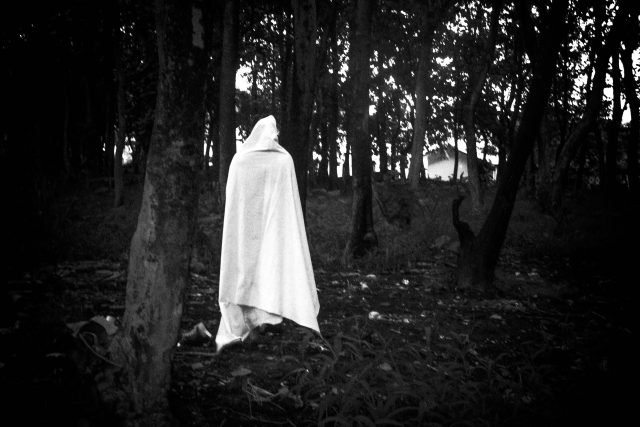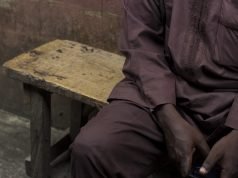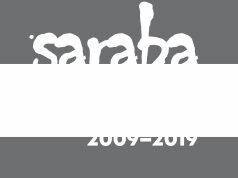Photograph by Ayo Akinyemi from the series “After Life”
The journey towards my truth is littered with untruths.
Like that time I denied being queer when dad asked me directly. It was right as I was starting grad school in Eastern Washington in 2000. He traveled all the way from the red soil of Ibadan, Nigeria, to visit me in rainy Seattle, where I was sowing wild oats before the semester began. I’d driven there from Charlotte, North Carolina, my home for 9 years, in a red pick-up truck chock full of every possession I owned in the world. My first day in town, I parked my truck in a parking lot, found a bed in a hostel smack dab in the middle of Belltown, and, a few hours later, a queer to share that bed with. The ensuing tryst lasted days, but coincidentally, ended just in time for Dad’s arrival.
In a Japanese restaurant near Pike Street Market on his first full day in town, my heart did emotional somersaults in its cage over my 25-year-old life and how vastly it differed from the one he’d intended for me.
“It’s easy. You hold it like this.”
He held the slim, dark, wooden chopsticks between his index finger and thumb, opening and closing them to show me how. I mimicked him, picking up the sushi and clumsily stuffing it into my mouth. I smiled at him. He smiled back. While we ate, I almost forgot about my quivering stomach and sweat-slicked palms. This was our first face to face in years. No longer was he just a voice on the other end of the phone line.
“I’ve been hearing rumors about you.
Silence.
“Are you gay?”
I took in the face of this man seated before me, his broad forehead, deep-set eyes hidden behind thick coke-bottle glasses, and thick lips pink like mine. The vertical tribal marks on either side of his face, partially obscured by a full beard. I looked at this man, a chemical engineering genius—the first one to get a college education in his village. A man who survived racist Britain while earning his PhD in the 60s and went back to Nigeria in the oil boom 70s to climb his way to the upper echelons of the country’s oil industry. I flashed back to all those nights in my grade school years, when he’d sit with me and together we’d work our way through my math assignment. I looked at this man who sat before me, whose love and respect I couldn’t imagine losing.
“No, Dad.”
“So why don’t you have a boyfriend? You’re in your mid-20s; this is the time you should start to settle down.”
“Because I’m focused on my studies.” There was the answer that could pacify any Nigerian parent.
“Yes, that’s good, but we should start finding you a husband.”
Instead of responding, I looked away. Later, as we waded through the crowds at the nearby market, our noses assailed by Puget Sound’s sulfurous smell, I felt the crippling weight of expectations and tradition bearing down on my shoulders.
Throughout my first year of grad school, this weight cast an illicit light over my every move, making all my relationships with lovers seem dirty. By the end of the year, I was buckling under the nagging fear of being found out and the frustration that being queer would put my family out of reach. I wanted out. I wanted a permanent respite from the omnipresent thought that I was doing something horribly wrong.
***
A year later I came out to him in a flurry of email declarations. In my attempt to shirk off the perpetual shame I wore like a shroud, my words to him were harsh and callous with a ring of finality to them.
I don’t need you.
His response was just as I’d expected: cries of betrayal, angry outbursts, and expressions of disgust. Disgust turned to silence; the kind occasionally punctuated with angry missives and tearful phone calls. I wanted to reject him as much as he was rejecting me. I wanted to stand firm. I wanted to assert a sense of non-shame, even though that was a farce. I wanted to not miss him, not notice the pain tugging at my heart as his withdrawal from me became more and more evident.
The holidays were the worst because the phones stopped ringing. Gone were the Merry Christmas calls during which period the phone would be passed from aunty to uncle to cousin, one to another, and which Dad would cap off with a “We miss you.” Gone too were the visits, the reunions at the airport where we’d simply look and smile at how time had physically transformed us, and his customary “Look at you. You’re a big girl now.” Gone were the dinners after those reunions where stories would be told and photos of babies passed around, with prefaces like “Remember your uncle Moshood? That’s his latest one.” Births and deaths were reconstituting my family, while time and distance were slowly erasing my place in it.
***
I saw him again in 2005, on a day sunny and overheated in characteristic summer LA-days. Instead of coming to see me in New York, he had chosen to visit distant relatives on the West Coast. It was a not-so-sweet reunion. During the days leading up to the reunion I was an anxiety-ridden mess. I tried to reduce that thing¾the physicality that evinced my queerness and my gender transition. The brown lipstick I’d given up years ago at the dawn of my gender shift I slapped onto my thick lips. The stubble finally finding their way through my facial skin I lopped off. I could do nothing about the shoulder-length dreadlocks he hated simply because they weren’t “ladylike.”
In 2000—that time in Seattle—my mouth had been full of lies in response to his question about my sexual orientation. This time, I decided to become a shameless lesbian. I made no mention of being trans. I did not tell him about how, when I was little, it both thrilled and confused me that people thought me a boy. I did not talk about the impact his strong, quiet, and gentle masculinity had on me. That in contrast to my mom’s perpetual rages, his presence was one of a still ocean with endlessly mysterious depth. I did not also mention how my pride for him and his brand of masculinity influenced my FTM journey, and how, unfortunately, his constant adultery also played a role in how I never seem satisfied in relationships. That while my anger towards him for his homophobia simmered for years, I came out as trans and, to my surprise, testosterone molded my face to resemble his own. Did he notice how much I looked like him?
***
En route to our reunion, in 2005, butterflies fluttered furiously in my belly as my flight took to the blue skies of New York City. They continued to clamor noiselessly as the plane alighted onto the tarmac of LAX, the heated asphalt looking like a deep, gray, undulating sea. For just 24 hours, I was exchanging the sweltering summer of Brooklyn for an equally humid LA.
On the ride from the airport to his hotel, the tension, the fear of yet more rejection, brought on tremors.
I… dissociated.
His hotel room door was a deep walnut brown with blond streaks.
His belly protruded through his shirt. It was almost as round as a soccer ball.
“Come in.”
In the room there was a very familiar scent.
On his face was a very familiar small smile, his telltale sign of restraint.
No embrace for the prodigal child.
Is he happy to see me?
The hotel room was a posh affair.
Beige leather sofa.
Expansive solid wood dining table with matching cushioned chairs. The sun’s rays cast an amorphous shadow on the table’s surface.
They are seated on the couch. I’d seen their faces in pictures where they flash toothy smiles and hold their bodies in poses. Mother and small child.
“This is Obi and this is Adeola,” he said gesturing towards them.
Adeola.
I met my baby stepbrother for the first time.
He couldn’t look me in the eye.
Stepmother regarded me with one penciled eyebrow raised.
Black sheep.
“Ah ah, you’ve caused your father a lot of pain O!” Her mouth formed a perfect circle when she said “O.”
Ignoring her, but staring at him, my baby brother. He had Dad’s forehead, thick lips, and fat cheeks. I wanted to give him a hug that translated all my hopes and dreams for him.
“Okay we are going shopping. Oya! Let’s go, Ade,” she quickly ushered the young child out of the room, leaving Dad and I alone.
From somewhere outside the room, further down the hallway, a voice called out “Housekeeping.”
From inside this room, there was only silence.
Then there was…
“…not right…
“…abomination…
“…no one raised you this way.”
His lips curled in disgust then straightened right away. It was a tiny glimpse into what he had been holding back.
Something tickled my nose. That recognizable scent again.
Suddenly, I’m 8 years old watching Dad knot his tie in front of the bathroom mirror of our Port Harcourt home. He pours a generous portion of Yves Saint Laurent onto his hands, palms as tough as leather, and slaps it onto his face and neck.
“…I’m happiest when I’m alone,” he said. I don’t remember how we get here, but all of a sudden his face is all despair, and I’m glimpsing his misery. It gives context to the tales my sister has shared with me in recent years about Obi, the younger, rage-filled, conniving woman he married after divorcing my mom.
I’m happiest when I’m alone.
Those words follow me onto the airport-bound taxi I board later. As my cab pulls away, as I wave goodbye to him, the words echo, ricocheting in my skull.
Pay attention, my mind says, so I look intently at his receding, waving form.
Three years later, I came to understand the full significance of my mind’s message.
***
Dad passed away in the fall of 2008.
“According to the doctor, it happened mid-act.” On shaky legs, I stood in my Brooklyn apartment, while my sister’s voice trailed from the phone into my ear. I tottered to my bedroom where I just sort of melted into the bed, grief darkening the edges of my vision. I had all the time in the world, I thought. I could gradually repair our disastrous relationship, I thought. His last email to me, a few months earlier—the one about spending Christmas at my elder sister’s home in London—had given me hope that this was possible. He was inviting me to join them, a first. He actually wanted to see me.
“He’s on life support. The doctors aren’t hopeful, my dear.” Sis sounded as weary as someone on whose shoulders rested Mount Kilimanjaro. Hearing her voice break, I could hear echoes of the sobs that had convulsed her body hours ago.
The stroke that took him was as sudden as it was swift. It was an efficient mechanism, overturning all our lives—me, my siblings, the numerous relatives depending on him for survival, the lover he’d been on top when it happened, the younger woman he was married to at the time, and the other one he used to be married to: my mother. All at once, he became an in-and-out-of-consciousness convalescent, spending his last few days on a hospital bed in Ibadan, with tubes threaded into his body and a machine beeping at his side. My elder sister was the only one of his children who made it to his deathbed in time. She leaned over his frail form, cooing “It’s okay, Dad, let go.” And he did, leaving behind an unfinished will with no clear instructions of what to do with his estate. Jostling among his relatives for his hard-earned cash and houses and land—acres upon acres of land—began. In the midst of the fray, my elder brother managed to get my siblings and I a little over $40K each. It had been like squeezing blood out of stone.
I burned through my share quickly, as quickly as I wanted to burn away the memories of our estrangement. I thought getting back to being broke would reveal some truth. It didn’t. It didn’t wipe away the guilt of choosing not to go home for his last few days on this earth or his funeral, even though the choice to stay here and protect my immigration status was not much of a choice. I was in the midst of my political asylum application and my gender transition at the time of his death. The asylum process was a last ditch effort to gain legal status in the States after many years of being undocumented. It was also a desperate bid to prevent deportation back to Nigeria, where the parliament was hard at work on a “jail the gays” bill, and large swaths of my people were allowing themselves to be swept up in a particularly virulent form of homophobia, the kind manufactured by American churches and exported to African soil.
“I don’t recommend it,” my lawyer told me when drowning in an ocean of grief I asked him whether I should petition ICE (then INS) for permission to attend Dad’s funeral. “You will not be let back in,” he cautioned. You will not be let back in. Seven words, still as terrifying to me today as they were years ago, when I realized it was where I preferred to be. So, I stayed, and was not present at the procession through his tiny village of Saki, where throngs of people hoisted his coffin overhead and sang praise songs. I missed the lowering of his coffin into the earth, the tossing of dirt onto its surface, and the final goodbye. I missed it all.
I fucked my way through the grief. Fueled by an insatiable desperation, a curiosity I could not name and an all-consuming feeling of loss I couldn’t shake off, I sought solace on gay hookup sites. Sometimes I greeted these lovers with nothing but a smile, loose-fitting pants, and no underwear. Atop the blood-red sheets of my bed, we fumbled for each other in the dark. Directly below my giant bedroom windows, cars careened down busy Metropolitan Avenue. Their sounds roared into the room and mingled with the music streaming from my squat white speakers, creating a multilayered urban soundtrack. I fucked many, too many to name. Through it all, the void created by his sudden death and our unresolved relationship remained.
***
In my early teens, during our war years and the intercontinental silence, Dad’s job promotion took us to Kaduna, an arid province in Northern Nigeria. Before our house was ready, the company put us up in a hotel made of red brick on the outside and polished marble on the inside. I remembered the bookstore in the lobby and the Buchi Emecheta and Dean Koontz novels Dad bought me from there. At dusk, we walked through the streets of Kaduna. Along the way, hawkers approached us selling wares of plantain chips and Fanta. Cattle, their horns a whorl on either side of their head, roamed, herded by boys, made even darker by the sun. Tall bony men in long, light-colored caftans grilled meats and plantain top halved drum barrels.
“What’s this?” I asked after I chewed and swallowed the bit he bought and tore up for me. Its peppery delicious heat causing a sharp sensation that went straight to my head.
“Pigeon,” he said, his thick glasses sliding down the shiny, wide bridge of his nose gleaming with sweat.
“I want more,” I said. Dad smiled in response, tearing up another piece for me. Sweat trickled down the crevices of the tribal marks on his face, the part not obscured by his full beard.
I looked up at him, pride like stars in my eyes.
I was daddy’s little girl and nothing could erase that.
































